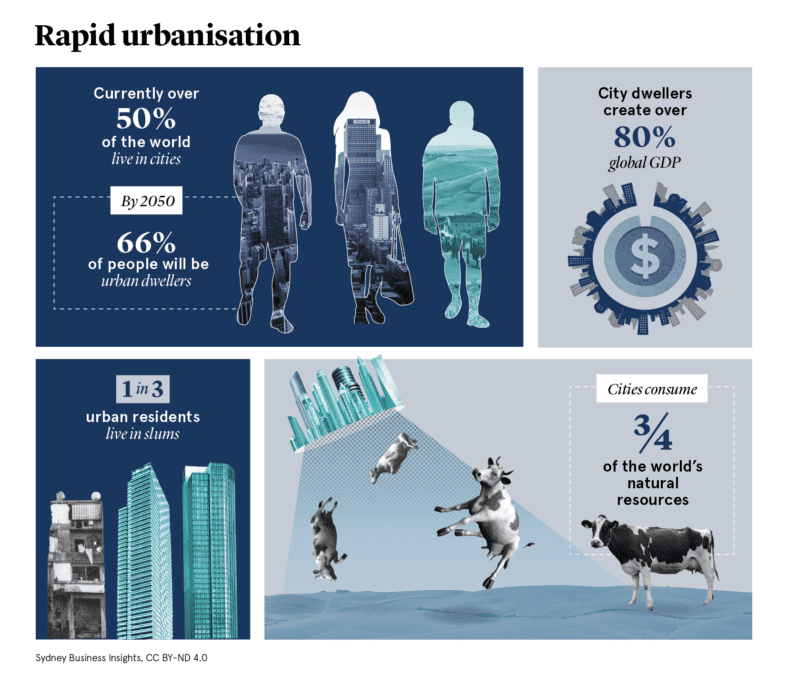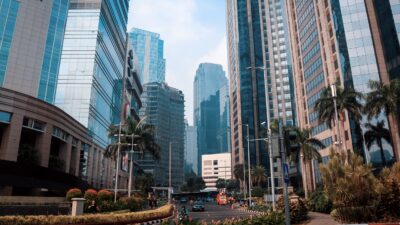The future is urban. Currently, more than half the people in the world live in cities, which account for more than 80% of global GDP.
The rapid urbanisation megatrend is the story of where most of us live.
By 2050, just over two thirds of humanity will be urban dwellers.
Cities are engines of creativity and innovation, and most urban dwellers experience higher standards of living than those in rural areas.
Cities can also be more efficient in terms of land use, and the distribution of resources.
Yet, one in three urban residents lives in a slum household.
Cities cover only 2% of the world’s land surface, but activities within their boundaries consume more than three quarters of the world’s resources.
Poorly planned urbanisation is a key driver of CO2 emissions.
Urbanisation is occurring at different rates around the world: The UN says the bulk of urban growth will happen in the cities of developing nations.
Eight out of ten of the world’s most populous cities are currently in Asia.
By the next century, 13 of the largest megacities are predicted to be in Africa, and three will be in India. None of the top 20 will be found in America, China, or Europe, as ageing populations shrink large cities in these regions.
Africa will also feature the world’s largest urban agglomeration – by the end of the century, half a billion people will live in the nearly 1,000 kilometre stretch from Lagos in Nigeria to Abidjan in Côte d’Ivoire.
While urbanisation creates huge opportunities for smart, eco-friendly cities, it also makes demands on infrastructure, the environment, and the provision of jobs and services, especially in developing economies. Increased density and an ageing population mean we need to rethink healthcare and public services to better share urban spaces.
More congested cities pose climate change challenges from rising emissions, but also offer potential solutions. This megatrend is an opportunity to develop low carbon and resource efficient cities of the future. We will need to ensure that future cities offer a decent standard of living and increased opportunities for the people living in them.
The World Bank (2023). Urban Development. Available at:
https://www.worldbank.org/en/topic/urbandevelopment/overview
Ritchie, H., Roser, M. (2019). Urbanization, Our World in Data. Available at:
https://ourworldindata.org/urbanization
UN Habitat (2018). Land Use Efficiency, United Nations Human Settlement Programme. Available at: https://unhabitat.org/sites/default/files/2021/08/indicator_11.3.1_training_module_land_use_efficiency.pdf
Venditti, B. (2022). ‘This chart shows the impact rising urbanization will have on the world’, Visual Capitalist. Available at:
https://www.weforum.org/agenda/2022/04/global-urbanization-material-consumption/
Desjardins, J. (2018). ‘World’s Largest Megacities by 2100’, Visual Capitalist. Available at:
https://www.visualcapitalist.com/worlds-20-largest-megacities-2100/
French, H.W. (2022). ‘Megalopolis: how costal west Africa will shape the coming century’, The Guardian 27/10/22. Available at: https://www.theguardian.com/world/2022/oct/27/megalopolis-how-coastal-west-africa-will-shape-the-coming-century
United Nations’ Department of Economic and Social Affairs (2018). ‘Around 2.5 billion more people will be living in cities by 2050’. Available at:
https://www.un.org/en/desa/around-25-billion-more-people-will-be-living-cities-2050-projects-new-un-report
World Population Review (2023). ‘Largest Metro Areas in the World’. Available at:
https://worldpopulationreview.com/world-city-rankings/largest-metro-areas-in-the-world

We believe in open and honest access to knowledge. We use a Creative Commons Attribution NoDerivatives licence for our articles and podcasts, so you can republish them for free, online or in print.

















